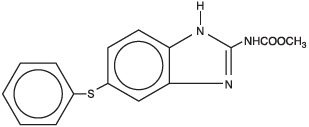Safe-Guard Fenbendazole Paste
Generic name: fenbendazole paste
Dosage form: FOR ANIMAL USE ONLY
On This Page
Paste 10% (100 mg/g)
HORSE AND CATTLE DEWORMER
396663 R13
DESCRIPTION:
Safe-Guard® (fenbendazole) Paste 10% contains the active anthelmintic, fenbendazole. The chemical name of fenbendazole is methyl 5-(phenyl-thio)-2-benzimidazole carbamate.
The CAS Registry Number is 43210-67-9.
The chemical structure is:

Each gram of Safe-Guard® Paste 10% contains 100 mg of fenbendazole and is flavored with artificial apple-cinnamon liquid.
ACTIONS:
The antiparasitic action of Safe-Guard® Paste 10% is believed to be due to the inhibition of energy metabolism in the parasite.
INDICATIONS:
Horses: For the treatment and control of large strongyles (Strongylus edentatus, S. equinus, S. vulgaris), encysted early 3rd stage (hypobiotic), late 3rd stage and 4th stage cyathostome larvae, small strongyles, pinworms (Oxyuris equi), ascarids (Parascaris equorum), and for the control of arteritis caused by 4th stage larvae of Strongylus vulgaris in horses.
Beef and Dairy Cattle: For the treatment and control of: Lungworms: Adult Dictyocaulus viviparus; Stomach worms: Adult brown stomach worms (Ostertagia ostertagi), Adult and fourth stage larvae barberpole worms (Haemonchus contortus), fourth stage larvae barberpole worms (H. placei), and Adult and fourth stage larvae small stomach worms (Trichostrongylus axei); Intestinal worms (Adult and fourth stage larvae): hookworms (Bunostomum phlebotomum), thread-necked intestinal worms (Nematodirus helvetianus), small intestinal worms (Cooperia punctata & C. oncophora), bankrupt worms (Trichostrongylus colubriformis), and nodular worms (Oesophagostomum radiatum).
One syringe deworms 4 (1,000 lb) cattle or 4 (1,000 lb) horses at a dose of 5 mg/kg or 4 (500 lb) horses at a dose of 10 mg/kg to treat ascarid infections.
PRECAUTIONS:
Horses: Side effects associated with Safe-Guard® Paste 10% could not be established in well-controlled safety studies in horses with single doses as high as 454 mg/lb (1,000 mg/kg) and 15 consecutive daily doses of 22.7 mg/lb (50 mg/kg). At higher dose levels, the lethal action of fenbendazole may cause the release of antigens by the dying parasites. This phenomenon may result in either a local or systemic hypersensitivity reaction varying in severity from itching or a rash to increased respiration and collapse. A veterinarian sho...



